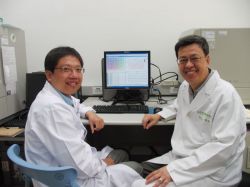There are 400 million people worldwide, including 18% of adult population in Taiwan, are affected with chronic hepatitis B virus (HBV) infection. Dr. Chien-Jen Chen of Genomics Research Center (GRC) has dedicated to the investigation of association between chronic HBV infection and liver cancer for more than two decades. His research article to be published in the Journal of the National Cancer Institute on August 20th brings up another clue for the prediction of liver cancer risk and could help target chemoprevention strategies globally in the future. The report points out that by checking the HBV genotype and mutants, it is possible to predict the possibility of developing liver cancer in chronic hepatitis B patients.
The study led by Dr. Chien-Jen Chen started from 1991. By recruiting a total of over 23820 volunteers randomly from 7 townships in Taiwan, they identified 4155 participants who were HBsAg-seropositive yet without liver cancer at the time of study entry and periodically followed them throughout the period from 1992 to 2004.
The group had pinpointed the importance of checking the HBeAg serostatus (New England Journal of Medicine, 2002) and serum HBV DNA level (Journal of American Medical Association, 2006) for the prediction of liver cancer risk in such patients. The findings have led the revisions of clinical guidelines for chronic hepatitis B management. Seropositivity of HBeAg is a biomarker for the active replication of HBV in patients affected with chronic hepatitis B. The HBeAg-seropositives were found to have a six-fold risk of liver cancer compared to those who were seronegative for HBeAg. They further found an increasing liver cancer risk across a biological gradient of serum HBV DNA level regardless of HBeAg serostatus.
Researchers have previously identified eight genotypes of HBV and a variety of mutations in two regions of the viral genome, referred to as the precore and the basal core promoter. It was not known the extent to which different HBV genotypes or mutations are associated with the risk for liver cancer. To find out, Dr. Chen’s group characterized the HBV DNA in the samples collected from 2,762 study participants in 1991-1992.
After a total of follow-up of 33,847 person-years, a total of 153 participants were diagnosed with liver cancer after study entry. Their finding shows HBV genotype C and a particular mutation in the basal core promoter (A1762T/G1764A) were associated with an increased risk of liver cancer. And another kind of mutation in the precore region (G1896A) was associated with a decreased liver cancer risk.
Such specific information may bring a clue for doctors to help identify individuals “who are at an increased risk for liver disease progression and would therefore potentially benefit from early interventions, such as reg¬ular screening to detect disease progression, and treatment,” claimed Chen.
In an accompanying editorial, Josep Llovet, M.D., of Mount Sinai School of Medicine in New York and Anna Lok, M.D., of the University of Michigan Medical Center in Ann Arbor review the previously known risk factors for liver cancer, prevention strategies to reduce the risk of HBV infection, and treatments for individuals who have already developed liver cancer.
|
“One of the main challenges is to determine whether secondary prevention can be accomplished with new antiviral therapies for HBV infection,” the editorialists write. When secondary prevention strategies are tested in large randomized trials, patients should be stratified by known risk factors, including viral genotype and mutations.
